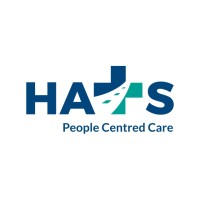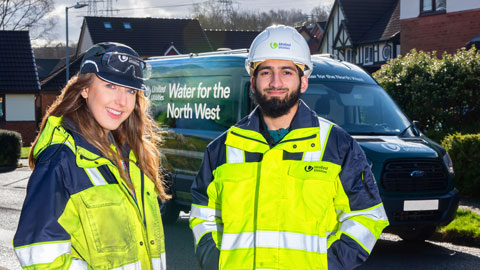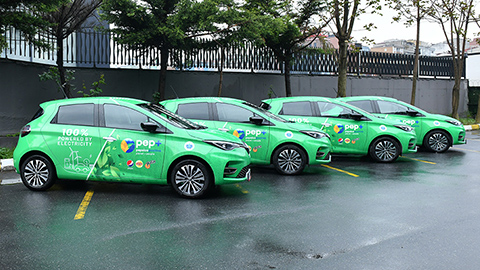.jpg)
HATS Group: Reducing fleet risk with insights from Geotab’s camera-based telematics solution
.jpg)
Table of contents
The HATS Group is the UK’s leading private provider of transport services for patient healthcare, mental health and Home-to-Schools for children with special educational needs and disabilities.
Challenge: Spiralling fleet insurance premiums
HATS Group’s fleet insurance premium had risen considerably due to a high number of claims that were causing their insurer to make a loss on their account. At renewal, it was agreed with the insurer that they needed to bring down the frequency and cost of their claims, and a more advanced telematics system was required to help them meet those objectives.
After exploring this market further, HATS recognised that tremendous advancements had been made in the fields of risk management, including dash cameras to empower drivers to self-correct and improve their behaviour to prevent incidents, as well as to support them in the event of any road traffic incidents.
Solution: Real-time driver support and safety insights
Geotab GO9 devices and Lytx Surfsight AI-12 dash cameras with road- and driver-facing lenses were initially installed across a quarter of the fleet. As the vehicles work at very busy hospitals that operate 24/7, including in Central London, the installation technicians had to adapt to the HATS Group drivers’ schedules to make deployment easy and to ensure there was no associated downtime.
After installation, the first priority for HATS Group was to improve fleet safety to counter their rising insurance premiums. Their initial focus was therefore on easily addressable driver safety KPIs such as correct use of seat belts and reducing driver distractions, using the in-cab lens with machine vision and artificial intelligence.
As well as utilising in-cab coaching, the operations team are now able to provide telematics data and camera footage to their training department so that they can actively work with drivers to help them improve their performance, rather than simply reprimanding them after safety incidents. This tailored approach to training is assisting driver development, improving morale and further reducing incident rates.
The driver is alerted first to risky behaviour and given the chance to self-correct. If that doesn't happen, an alert is sent to the operations team for them to be made aware of an issue, or in the event of an accident. This allows them to support the driver in near real-time, as well as to have instant access to the incident footage from inside the cab and on the road, together with the telematics data to show how the vehicle was being driven at that moment in time. This holistic view of the incident has made an immediate impact in managing the costs of incidents, supporting drivers and contesting fault.
“With Geotab telematics, our drivers feel more confident behind the wheel, knowing that if they have an incident and they're not at fault, they will have the support of dash camera footage and telematics data to protect and clear them. It also helps our control staff to be able to pick up on issues straight away and help drivers in real-time when they’re on the road.” – Peter Barnes, Head of Patient Transport for SE London, HATS Group
The operations team are also starting to delve into the telematics data to understand where further optimisations and efficiencies can be made. This includes looking at vehicle utilisation to identify which vehicles could be better used daily, and analysing patient wait times and associated idling times to identify opportunities to decrease fuel consumption and vehicle emissions.
Impact: Safer for drivers, patients, and other road users
78% reduction in frequency and 96% reduction in the cost of road traffic incidents - HATS Group initially trialled the combined Geotab and Lytx solutions across 13 of their vehicles, at one of their larger sites. In the 4 months leading up to the trial, there had been 18 incidents at this site, with a cost to their insurer of £30-35k. Over the 4-month trial period, there were just 4 incidents, with a total cost to their insurer of only £1,500. This was a single-vehicle incident, involving no other road users.
74% reduction in seat belt violations - At one site in South West London, the team noticed a dramatic reduction in seat belt violations within the first weeks after Geotab telematics devices and Lytx cameras were installed across the 50 vehicles. This number is continuing to decrease as drivers learn to change their habits with the help of in-cab coaching visual alerts, making it safer for their drivers and their patients.
Improving the outcome of claims - As HATS Group rolled out the systems across other hospitals, one of their vehicles was involved in a road traffic incident with a motorbike. If the insurers had only received a written accident report, as they would have done previously, the insurers would have concluded that the HATS Group driver was at fault. Instead, they were able to support the claim with dash camera incident footage, and the resulting decision was that the incident was a split liability. This continues to be a significant benefit of the system.
Improved service success - The increased control of driver safety behaviour is decreasing the frequency and severity of accidents. As a result, HATS Group has noted that they have reduced vehicle downtime, which in turn allows them to offer a better service to their customers.
Reduced risk to help reduce insurance renewals - HATS Group is now able to show their insurer how the group is actively improving risk management with the support of telematics data and dash cameras. Specifically, this includes reducing the time to act after an incident, supporting claims with camera footage, and improving driver behaviour through targeted training and intervention. When they come to renew their fleet insurance, this evidence, together with their lower incident rate and cost will help to support their case to lower their premium.
“With Geotab, I can now get a clearer picture of any incident which takes place with one of our vehicles with the new technology and manage the associated risks better than I could have done before. I now have the data and footage to be able to argue with insurers that our premiums should come down. The cameras, and the ease of access to that footage on the MyGeotab platform, makes managing fleet risk so much easier for me.” – Jon Trotter, Head of All Insurance, HATS Group
Next steps - Deeper data dives and centralised control of fleet maintenance
HATS Group is in the first stage of its process of integrating telematics and dash camera insights into its fleet operations, with a primary focus on improving driver safety to reduce their risks.
In the second stage, the operations team wants to focus on the telematics data surrounding driving performance in the Driver Safety Scorecard, as well as idling, to reduce fuel costs and further improve driver safety. They also recognise further opportunities to use the data to improve vehicle utilisation.
Having seen MyGeotab’s fleet maintenance capabilities, Peter Barnes identifies this to be their next major integration. The Group currently has several separate systems for different elements of fleet maintenance, and Barnes instead wants to gain centralised control through MyGeotab, with one location where drivers log in on their PDAs, and where all the data is stored.
“Scheduling maintenance through MyGeotab’s maintenance software will be really helpful operationally so that we can pre-plan maintenance work to get ahead of the game.” – Peter Barnes, Head of Patient Transport for SE London, HATS Group
From the Head of All Insurance
“We’ve seen a massive change since we installed the Geotab devices and the Lytx cameras. If our driver is involved in an incident, we get an immediate notification so that we can support the driver and manage the claim in real-time, with footage of what our drivers were doing in the cab, and how that relates to the road. Before, we could only ever be reactive in our approach to incident management, but now we can be proactive, providing tailored training to drivers when we’re alerted to unsafe behaviour. It also means that we can identify vehicles that clip our vehicles and don’t stop - something that was never possible before. This all adds up to make our drivers and patients safer, and to reduce our insurance risks.” - Jon Trotter, Head of All Insurance, HATS Group
In a nutshell
Goals and challenges
- High frequency and cost of road traffic incidents
- Spiralling fleet insurance premiums
- Lack of ability to manage their risks with existing telematics provider
Solution
- Installation of GO9 devices and AI-12 dash cameras planned around HATS Group vehicle availability to ensure no vehicle downtime
- Initial focus on improving fleet safety to counter rising insurance premiums
- Strategy to increase seat belt wear and reduce mobile phone usage violations with in-cab coaching alerts to address the behaviour in real-time
- Telematics data and video footage were provided to the training department for tailored driver safety training and development
- Notifications are sent to the operations team for accidents to provide drivers with real-time support and actively manage insurance claims
- Analysis of telematics data to identify opportunities to improve vehicle utilisation and reduce vehicle idling
Results
- 78% reduction in frequency and 96% reduction in the cost of road traffic incidents at the trial site
- 74% reduction in seat belt violations at one site
- Improving the outcome of claims with supporting video footage
- Improved service success with fewer accidents resulting in less vehicle downtime
- Reduced risk to help reduce insurance renewals
Geotab products/features
- Geotab GO9 telematics device
- MyGeotab fleet management platform
Marketplace products
- Lytx Surfsight AI-12 intelligent dash cameras
Post Tags
Client profile

Client name:
HATS Group
Industry:
Patient healthcare transport provider, Home to Schools Transfers
Types of vehicles:
Cars, ambulances and shuttle buses
Fleet size:
940
Other stories
%20(1)%20(1).jpg)
Tarmac achieves a safer, more sustainable, data-driven fleet via Motormax and Geotab's solution
April 8, 2025
.png)
Moove Cars optimises its fleet with Geotab technology, saving over £3,000,000 per year
February 26, 2025

United Utilities: Improved fleet sustainability, driver safety, and vehicle availability
September 20, 2024

PepsiCo TR instils fleet safety at the heart of its operations with Geotab
May 9, 2024
